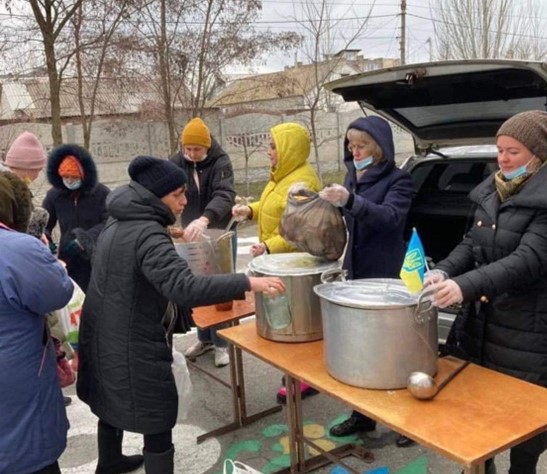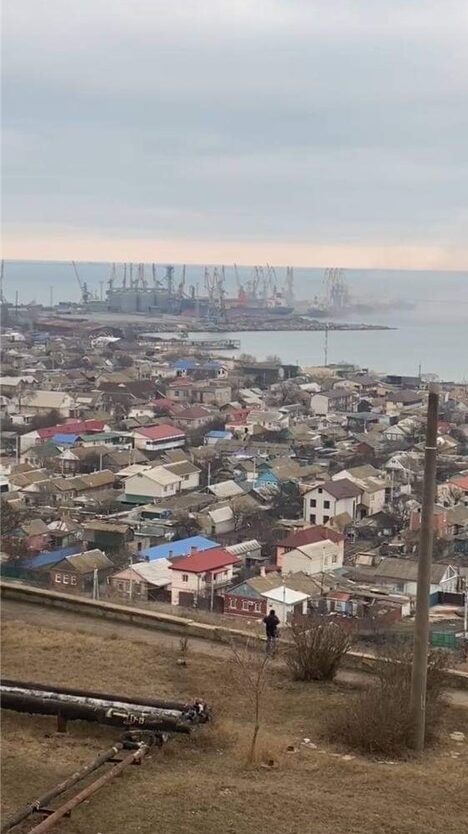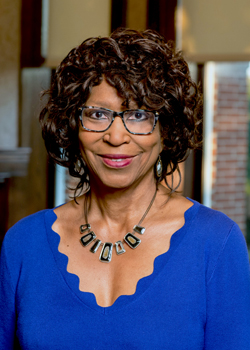
by Joanne Barnes, Chair, ILA Board Membership Committee; Professor of Leadership Studies & Past Dean of the Graduate School, Indiana Wesleyan University
16 May 2022
Share this article:
Introduction
On the 24th of February, Ukraine came under attack and was invaded. The news has covered the stories. Men, women, and children, people of all ages and walks of life have had their world turned upside down. We hear about the heroes — the Ukrainian president, and his steadfast resolve to stand in the face of adversity. Yet, there are women and young girls who do not make the headlines, who are in Ukraine and across the border working to support all Ukrainians. These women and young girls often do not communicate with their husbands and fathers for days. They don’t know if they will ever see their loved one(s) again. But they continue to support and do what they can, using the skills they have to make a difference.
Shortly after the invasion, I reached out to my dear friend Valentyna, “Valya,” to check on her safety and to see if she would share her perspective on the ground with the ILA. The following is a lightly edited interview I conducted with her. I have not included her last name in the interview over concerns for her safety and the safety of her husband. A silent, humble leader, Valya is a woman who continues to cry openly as she does not know if she will ever be able to go home again. She does not know the fate of her husband and extended family. She cries, not as a sign of weakness; but because leading with emotions is okay.
Interview
Joanne Barnes: Valya, I would like to share your story about what is happening in Ukraine, what do you think?
Valya : My friend asked me to share about how the war started for me. I wanted to refuse initially as I am not a good speaker. But after I talked to her, I gave in as I realized a very important reason for us to talk about the war – to remember, stay alert, and work without ceasing for the victory. We should not get used to it!
Joanne: Share with me, what was your decision to leave Kyiv?
Valya: My war story is short as I left the country on the third day, after the two sleepless nights. So, I encourage you to listen to other stories as everyone has their own. You will hear more dramatic stories and miraculouse rescues, but the start of it was the same almost for all – with the bombs exploding in the early morning and calls of scared and caring friends and relatives: “Wake up! The war started!”
Initially we could not even say these were explosions as they were too far away. We jumped up that morning, waiting for other explosions, scared and refusing to believe. I did not even dare to think that we would live through a war. As my grandmother, a World War II survivor, used to say, “war and famine are the worst things that could happen to humanity.” I heard it many times and thought that in our civilized society such things just could not happen. Of course, we had 2014, [when Russia annexed Crimea] but we were so stubborn to realize the realities of war and got used to it as the time went by.
We jumped out of bed feeling scared and lost. We tried to find some official information hoping to hear that it was a mistake, that it was not true and soon be over.
Joanne: Valya, your young daughter, Katia, was sent out of the country prior to the beginning of the war. How difficult was it to send her out of the country not knowing the future?
Valya: A week before the invasion, I sent our daughter to Poland to stay with her brother that lives there. I was just following my intuition, but not really believing we would end up in a war, not accepting that the dark clouds were densely gathering over our heads. So, when the war started, to my great relief, I knew that my children were safe and together. If something happens to us, they will take care of each other.
Joanne: The resolve as a mother to protect her children has been seen many times across Ukraine — silent leadership to do what is best for others without recognition or accolades. You and Andrey are still in Kyiv, your daughter is safe in Poland, what were the decisions you made next?
Valya: We almost did not sleep the next days. In our region, we did not hear alarm sirens, but the scary explosions continued, and the Russians ruthlessly fought their way to Kyiv.
We decided to go west to our children and asked all our friends and relatives to go with us. At that time not many people wanted to go. There was still a great hope that this would end before we went west. For all of us, during those first few days, it was very difficult to grasp that the war was real and was here to stay. We all hoped to wake up the very next morning to the life we had before.
Joanne: I know it is difficult to reflect on what you have went through; however, will you share your journey as you left Kyiv?
Valya: We left Kyiv the next morning by car driving small village roads. Village after village took us further from Kyiv. Thank God for GPS as it made our journey possible, and for the other people on the road who drove carefully and safely. It took 12 hours on the road for a journey that usually takes 6! We stayed the night with our friends in western Ukraine and started for Lviv the next morning to catch a train to Poland. The station was crowded with people that seemed to live there. My husband couldn’t go out of the country, so he planned to stay with his friend, and they registered as volunteers. I went to Poland by train. The trip would usually only take 3 hours, but that day it was 24 long and exhausting hours. A trip that would normally take me 1.5 hours by plane, this time took 3 days.
There were so many people at the station, so many children. When the train arrived the crowd tightly closed around me, and I became captive to it as it carried me around – being in the crowd is scary! Thus, by the crowd I was carried to the train and got in. There were no places to sit, so I stood for many hours. After that, I sat a little, holding other people’s children in my lap. There was no air to breathe, and I fainted. When I regained consciousness, the train carriage became a community that took care of children and each other.
Nobody expected the train ride to go so long. People did not have enough water, food, baby milk, diapers. This journey was only possible due to the great efforts of the volunteer groups on our way. Every time the train stopped for several hours, volunteers brought water, food, baby milk with boiled water, sandwiches — everything to help us all survive this journey. At one stop there was even a little kitchen fire cooking hot soup, baking potatoes, even making coffee. We were really thankful for those hard-working tremendous people who managed to provide for so many people – more than a thousand. Arriving in Warsaw we also got into the hands of the volunteer groups organizing everything upon arrival. They were like saving angels flying with us on the way.
I was so happy to see my children and to feel safe.
Joanne: Valya, we have been friends for so many years, your train ride was so difficult, yet you continued to be strong and help care for others. You shared with me in one of our earlier conversations how the windows on the train would not open because of the age of train and how children would wake up trembling, yet through all of this and through your own struggles, other Ukrainian women and children became your priority as you assisted them on this long journey to Warsaw.
Joanne: You’re in Warsaw with your son and daughter, now what?
Valya: Yes, but the worry and prayer for the safety of the people that stayed in Ukraine is always with me. I pray that God will protect their homes, provide for their needs, and make them invisible to the invading soldiers. Nothing is treasured as much now as receiving an SMS [a type of text] from my cousin in the occupied region with the words “We are alive.” Peace is the greatest treasure now.
Joanne: There are so many men and women who are in Ukraine, fighting to protect the country you love, what are your thoughts?
Valya: I’m really proud of our army, the bravest, smartest, and most handsome army in the world. It breaks my heart to hear about every loss for the freedom of our country. Look closely in those faces — we should remember them always: athletes, champions, scientists, artists, all united in the fight. I’m really thankful to God for every one of them!
That is why I really want to call all of us not to get used to this war — fight it to the end and support it to the end. Support and provision are a great part of every victory, of every regained city and village, of every evacuated and rescued life. Let’s stay alert and deeply motivated to continue donating and supporting and sharing true information about this war – all of this save lives.
Joanne: What an amazing call to arms for support! I know your strength and your willingness to always help others, no matter what. Share with me, now that you are in Poland, what are you doing to support those still in Ukraine?
Valya: In Poland, I got involved in some initiatives organized and coordinated by the youth of our Ukrainian church buying supplies for the Red Cross, army, and territory defense brigades in every city and town. My part was small — writing and translating letters for our Western partners and lists of much needed supplies. I am also proud of those brave young people who day and night coordinate and send truck after truck to Ukraine from Belgium, from the Netherlands, and from other countries. These trucks with war supplies are so needed for the victory. Provision is a very important part of the war and a very demanding one.
During the war in Ukraine, we do not remember days of the week or dates — we count the days of the war. It was eighteenth today. Feelings of depression and loss, fear for all my friends and relatives, fear for the nation, feelings of being unrooted — they stay with me all the time.
Joanne: Valya, I know that you try to stay in contact with those still in Ukraine. Your daughter Katia has a friend, Sofia, who is just 16 years old. Sofia wrote a poem in Ukrainian, and you have translated her impressions about the war for me to share. Let’s look at what this beautiful young girl has shared.
Valya: Below you will find impressions on the war from my daughter’s friends in a poetic form:
Original:
Sofia, 16. City: Severodonetsk
“Освободители” на танках к нам заезжают в города.
Они приходят рано утром и подрывают все дома.
Где русский, там всегда разруха. Где русский, там всегда война.
Там ложь, там мрак, там нищета.
Там матерщина и насилье, там пьянки с ночи до утра.
Где русский, льются всегда слезы, там страх, отчаянье и боль.
Они не знают про свободу, про верность, силу и любовь.
Им не понять нас, украинцев, ведь мы верны своей стране.
Мы создаём, творим и строим. Мы ценим, любим, бережем.
И независимость свою из года в год мы в свет несём.
English Translation:
Sofia, 16. City: Severodonetsk
“Liberators” are driving tanks to our cities
They come early in the morning and blow up our houses.
Where there is a Russian, there is always devastation.
Where there is a Russian, there is always war, lies, darkness, and poverty.
There is swearing and violence, there is drinking from night till morning.
Where there is a Russian, tears always flow, there is fear, despair and pain.
They do not know about freedom, about fidelity, strength and love.
They do not understand us, Ukrainians, because we are loyal to our country.
We create, make and build. We appreciate, love, and protect.
And we carry our independence to the world from year to year.

Joanne: This is so powerful from a young girl just beginning to experience life, experience the world. Her future is so uncertain. How brave…young women leading through their voice. You shared with me the powerful words of another 16-year-old, Christina, who is from Berdiansk.
Christina, 16. City: Berdiansk
My name is Chris and in general this story will be about the small town of Berdiansk, which is located on the shores of the Sea of Azov. Unfortunately, the war that covered us, tremendously affected me, my loved ones, and my hometown.
On the 24th of February in the early morning, our military bases were subject to fairly large and strong blows, though the air defense station and all other military defense equipment was taken away beforehand.
But after the explosion it was quiet and calm until the moment when the Russian troops entered the city, but first the airport, since they had old maps, and no connection — they got lost. So, we heard lots of explosions and shootings from there till 2 p.m. They could not find the way to the seaport, they asked people for the directions. People gave them the wrong direction trying to confuse them, so that they would not reach the seaport. People blocked the roads with cars and did not give them the opportunity to pass.
But the next day they launched an attack on the seaport, ships, and port buildings. A bomb that aimed at the port was caught by the air defense station that remained at the port. So, it exploded in the air, and only the fragments flew into the port and damaged some area. The roar was all over the city. I was at that time on the street and jumped with fear because it was very loud. I live close to the port, 10-minute walk.
After that, everything became quiet for some time. The Russians walked around the city, put marks, scattered mines, went from house to house asking for food and water, robbed a large supermarket store. They controlled the checkpoints of entry and exit to the city, fired at cars that tried to drive in or out, blocked the road to the nearby villages and the delivery of products.
A little later when I went to the grocery store, they went to the police offices and the city authorities, and I heard shooting of the machine guns there… I ran to hide… Russians went to our passport office and took all the passport documents, biometrics, and data on people.
Since we have public transportation in the city, Russians entered buses and rob people of phones and all valuables. For a few days we did not have mobile connections and Internet access was cut off, there was no social media working at all. It was very stressful for me as a teenager. I didn’t even have the opportunity to write to friends and relatives to find out how they were doing.
At the moment we do not hear shooting, its rather quiet, I don’t know if this a sign to rejoice or be upset waiting for the worse. Psychologists work with people in our city. Also, the needy people are provided with hot meals and food supplies.
My family voluntarily helps and supports many families and people who came from the city of Mariupol, as it is very difficult situation there. As Mariupol is under severe bombing and shooting. People are cut off from gas, heating, hot water, and many are killed or dying.
It’s hard, but I’m sure we can handle it! Russian troops have not left the city, and still live here. People do all kinds of actions to protest. I really hope that this will end soon, I really want to return to my normal way of life.
Sincerely,
Chris
Joanne: Thank you for sharing the words of this very powerful young lady speaking out. Valya, you also have a friend in Mariupol. She shared the following with you.
“In my city of Mariupol, Ukraine, shelling again today. The whole city is blown up. The bomb hit near the house where my son Andrei and his girlfriend Tanya live. They are alive, but there are no windows in the apartment…. Where they will run and what they will do, I do not know. The weather is very cold outside, -6. Support me in prayer. I really need your prayer. 03/13/2022”
Joanne: As you continue to lead by translating and coordinating what is needed to help citizens of Ukraine, what are some of the organizations you are involved with besides the Red Cross?
Valya: There is a place that cares for battered women and children. They need blankets and baby cots.
Joanne: I know you have spoken much about Andrey. Is he ok? What is he doing in Ukraine?
Valya: Andrey is a volunteer. He is working on evacuations. He is safe for now.
Joanne: Thank you so much for sharing. I know this is difficult for you, but you are a role model to so many, especially the young women who are openly sharing and standing up for justice.
Conclusion
Leadership lessons. There are so many. Leaders persevere. Valya, whose voice may not be as loud as some, has shown perseverance in the face of danger. She continues to choose hope and love over hate and, as an excellent translator, shares the message of need. While Valya shared that there are times when she just cries and prays, the cycle continuing for hours, she will do what she can to make a difference. While she often shares with me that she is not a leader, she demonstrates leadership in her actions: Her story reminds me a quote from Maya Angelou: “A leader sees greatness in other people. He nor she can be much of a leader if all she sees is herself” (McGregor, 2014).
References
McGregor, J. (2014, May 28). Maya Angelou on leadership, courage and the creative process. The Washington Post. https://www.washingtonpost.com/news/on-leadership/wp/2014/05/28/maya-angelou-on-leadership-courage-and-the-creative-process/

Joanne Barnes (Ed.D.) is a Professor in the Ph.D. in Organizational Leadership program at Indiana Wesleyan University (IWU) and a senior consultant with Kozai Group in Diversity, Equity, and Inclusion. Joanne also consults in Cultural Competence and Diversity and is a certified trainer/coach in the Inclusive Competency Inventory, Inclusive Behaviors Inventory, Intercultural Effectiveness Scale, Cultural Intelligence, and Global Competency Inventory. She consults with business, healthcare organizations, boards of trustees and higher ed institutions to assist in developing cultural humility and creating a more equitable work environment. She also works with institutions to help them develop curricula that prepares students to enter a global workforce that desires leaders who have cultural humility. Dr. Barnes serves on the board of trustees for Houghton College in New York and is also a board member for the International Leadership Association. She has worked with the 2019/2020 United Nations WE Empower winners as a “master leadership coach” and served as leadership coach for the 2018 UN WE Empower winner from Jordan.

